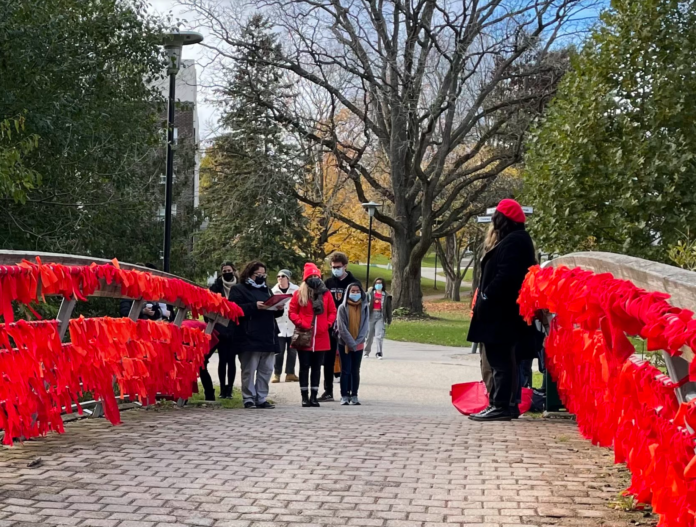Across Canada, Indigenous women and girls continue to face disproportionate levels of violence. To highlight this human rights crisis and raise awareness around the challenges faced by Indigenous communities, the Waterloo Indigenous Student Centre has set up an installation on the bridge between Environment 3 and St. Paul’s.
Known as “Bridge: Honouring the Lives of Missing and Murdered Indigenous Women, Girls and Two Spirit People (MMIWG2S),” the installation honours those who have been lost.
At the opening ceremony held on Nov. 3, the names of several MMIWG2S were read out loud. Red pieces of fabric representing each person were tied to the bridge. This year also had the addition of orange fabric alongside the red, which honours the lives of children who were abused and killed in residential schools.
The bridge memorial has been an annual event since 2016, when it was created for the 16 Days of Activism Against Gender-Based Violence at UW.
Dr. Sorouja Moll, a UW lecturer and the creator of the installation, spoke to Imprint about the origins of the project that began while she was completing her PhD in 2008.
“The number 520 was appearing over and over and over again in the news media as the statistic representing Canada’s missing and murdered Indigenous women and girls. One afternoon surrounded by books, theories, and questions, I stopped and I asked myself: ‘Who are these women and girls? Why don’t we, why don’t I know their names?’”
The following year, Moll continued to research the issue further and decided to launch a project to increase awareness.
“After much consultation and gathering of names, I made the names public by writing them on the streets of Montreal in chalk. With the ‘Writing Names Project,’ I opened a site at which embodied performative acts could acknowledge, honour, and name those lives who have been silenced by systemic racism. We are now aware that the statistic is beyond 5,000 lives.”
When Moll began working for the University of Waterloo, she brought the project with her.
“’Writing Names’ was installed using chalk in 2015 at the Arts Quad on campus. The following year I organized a three-day Summit that brought together Indigenous and non-Indigenous researchers, scholars and artists and instead of using chalk to write the names, we wrote the names on red fabric and tied them to the bridge to create a more long-lasting counter memorial for public interaction.”
Many Indigenous communities face socio-economic problems caused by colonization, including higher rates of poverty and mental health issues. Police have also been described as dismissive in many cases of MMIWG2S, suggesting systemic racial bias in the treatment of Indigenous people.
Moll encourages all students to reflect and engage in the topic to learn more.
“Become involved with your local communities; for instance, volunteer for soup lunches at the Waterloo Indigenous Student Centre, attend the annual WISC Pow Wow, and deeply reflect about and connect to the histories and land upon which you walk, learn and play. As a student who began with a research question and now as a teacher, I believe it is vital that students learn, understand, and practice the agency they have toward change.”
“In 2009, I was alone on the streets of Montreal writing names; in 2021, the project gathers together Indigenous and non-Indigenous community organizations, students, faculty and staff to remember, to honour, and to know that there is indeed much work to be done. There is no success until everyone, everyone in this country is safe from harm, until every community has clean water to drink, until colonial violence is dismantled in every sector,” Moll concluded.
The installation will remain open for two weeks and students are welcome to attend the closing ceremony on Nov. 19 at 1 p.m. to continue their reflection.































